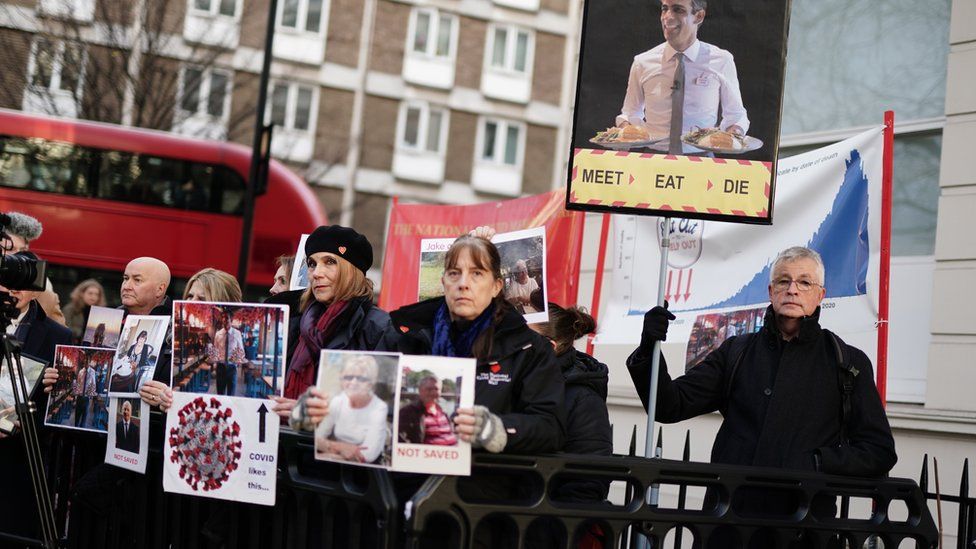Rishi Sunak defends the scheme and says advisers and ministers had “ample” chances to raise concerns.
This video can not be played
To play this video you need to enable JavaScript in your browser.
Rishi Sunak has robustly defended his Eat Out To Help Out scheme, implemented in summer 2020, saying it prevented “devastating” job losses.
The scheme encouraged people to attend pubs and restaurants by subsidising meals after lockdown rules were eased.
Mr Sunak said it was introduced after the safe reopening of restaurants.
He dismissed criticism that senior advisers were not consulted, saying they had had “ample opportunity” to raise concerns.
In previous sessions of the inquiry senior scientific advisers, as well as health secretary at the time Matt Hancock, have said they were not consulted about the Eat Out To Help Out Scheme before it was announced.
The inquiry has also been told that chief medical officer Sir Chris Whitty referred to the scheme as “eat out to help out the virus” and Sir Patrick Vallance – who was chief scientific adviser during Covid – said the scheme was “highly likely” to have fuelled deaths.
However, Mr Sunak – who was chancellor during the pandemic – strongly backed his decision to introduce the scheme.

More on Covid and the Covid Inquiry
- Did Sunak’s Eat Out scheme help to spread Covid?
- Five takeaways from Boris Johnson’s evidence
- What is the UK Covid inquiry and how long will it take?
- How inquiry is exposing deep flaws in Covid decision-making
- The private WhatsApp messages from inside Downing Street
- What to do if you have Covid: Can you go to work or school?

He said it was announced on 8 July and came into force at the beginning of August, and that in that period the chief medical officer had identified children returning to school, and winter, as “two significant risk moments”.
“He did not mention Eat Out To Help Out,” Mr Sunak said.
He also argued it was a “micro policy” introduced along with other safety measures such as table-only service, contactless payments and one-way systems.
“This was a very reasonable, sensible policy intervention to help safeguard those jobs in that safe reopening.
“I didn’t believe that it was a risk. I believe it was the right thing to do.
“All the data, all the evidence, all the polling, all the input from those companies suggested that unless we did something, many of those jobs would have been at risk with devastating consequences for those people and their families.”
He added that the evidence “conclusively demonstrates that this was in no way, shape or form responsible for a second wave”.

Image source, PA Media
Mr Sunak was also asked about claims the Treasury had been nicknamed the “pro-death squad” due to its stance on keeping hospitality and retail sectors open.
The prime minister said that wasn’t “a fair characterisation”, adding that the Treasury had worked “very hard” and “done things to save millions of people’s livelihoods”.
He argued that the sectors most impacted by the lockdown, such as retail and hospitality, were more likely to employ “the most vulnerable in society” such as those on the lowest incomes.
He said trying to protect jobs in those areas was a “matter of social justice”.
The inquiry has also heard criticism about Boris Johnson’s leadership style, with advisers saying he had a tendency to change his mind.
However, Mr Sunak defended his former boss, saying his interactions with No 10 “felt fine” and that Mr Johnson was right to “go over the arguments”.
He added he was not aware of complaints from advisers about Mr Johnson’s approach.
Mr Sunak also told the inquiry:
- Increases in the cost of government borrowing in March 2020 caused “enormous anxiety” in the Treasury
- He saw more of Boris Johnson than his own wife during the early days of the pandemic
- He was not a “prolific user” of WhatsApp and that he no longer had access to messages during the pandemic, having changed his phone “multiple times” over the past few years
- The amount the government borrowed during lockdown led to the current record-high tax burden “which we’re grappling with today”
- Changes were made to the process of buying personal protective equipment that enabled “pace at the expense of the same normal amount of rigour and scrutiny that would go into those approvals”
The prime minister began his evidence by saying he was “deeply sorry” to all of those who lost loved ones and family members in the pandemic.
He also offered an apology to “all those who suffered in the various different ways throughout the pandemic as a result of the actions that were taken”.
He added it was “important we learn the lessons so we can better prepare in the future”.